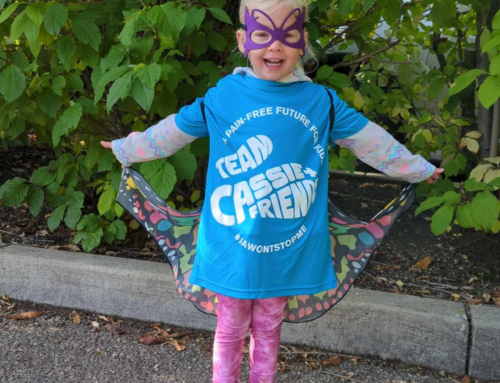This article was written and reviewed by the Cassie + Friends Medical Advisory Committee made up of Dr. Roberta Berard (London Health Sciences Centre), Dr. Nadia Luca (Alberta Children’s Hospital) and Dr. Lori Tucker (BC Children’s Hospital). To learn more about the Cassie + Friends Medical Advisory Committee, click here.
Some youth and families may have heard in the news or at their rheumatology clinic about new medications called Biosimilars. We asked our Medical Advisory Committee, composed of three pediatric rheumatologists across Canada, to share some information on what we should know and, most importantly, where to find the most accurate and up-to-date information specific to your child and family.
Biosimilars: Information for Pediatric Rheumatology Families in Canada
Biosimilars have been used to treat juvenile arthritis (and other childhood chronic diseases such as inflammatory bowel disease and vasculitis) in the United States for the past five years and longer in other countries around the world. Biosimilars are ‘copycat’ versions of biologic medications. There are very strict requirements in order for these medications to be approved by Health Canada.
According to the Food and Drug Administration, when comparing the biosimilars to biologics, these are given in the same way, provide the same treatment benefits and potential side effects and have the same strength and dosage as the biologic medication. Please see here for more general information on biosimilars in Canada.
At this time there are Health Canada-approved biosimilars for use in JIA and Uveitis for two originator biologics: etanercept (Enbrel) and adalimumab (Humira). The specific biosimilars available differ by province; and coverage by public and private payers may also differ. As of May 2021, in some provinces, patients starting on etanercept have to be started on a biosimilar if the patient is under the public medication reimbursement plan. In some cases, private insurance plans will follow the guidance from the public reimbursement and only cover biosimilar drugs. At present, in some provinces, there is a requirement for all patients who have been taking an original biologic to switch to a biosimilar product; in other provinces, there is not mandatory switching for pediatric patients. See our note below about how to find the most accurate and up-to-date information for your province.
Recently, five adalimumab biosimilars were approved for use in Canada for JIA. Two of these products are noted to be “citrate-free.” It is believed that this preservative is linked to the pain associated with adalimumab (Humira) injections. The citrate-free adalimumab biosimilars are Amgevita (supplied in 20mg and 40 mg preparation) and Hulio (supplied only in 40 mg). In some provinces, patients (of any age or weight) newly starting adalimumab under a public reimbursement plan will be started on a biosimilar. In some provinces, there is mandatory switching for all patients, including pediatric patients, from Humira brand to a biosimilar product.
The decision to start a biologic or biosimilar medication should be shared between the patient/family and the pediatric rheumatology team. You should discuss your child or teen’s specific situation with respect to a possible biosimilar start or switch with your pediatric rheumatology team. In addition to your child’s specific medical situation, these decisions may be influenced by access dictated by the payers. Your team is always happy to discuss with you what the options are based on your specific situation.
It is important to note that the situation across the country with respect to biosimilar drugs and availability is changing rapidly; in addition, there are differences between provinces. Talking to your own pediatric rheumatology team is the best way to receive accurate, up to date information!
Relevant Links:
Biosimilars: An Alternative to Biologics by the Arthritis Foundation










Leave A Comment